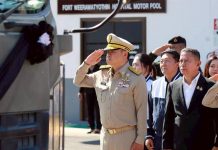This year, the National Police Bureau is set to toughen alcohol ban during the Songkran period in a bid to keep influx of local and foreign revelers in order.
National Police Spokesperson Pol Maj Gen Piya Uthayo said sobriety checkpoints would be set up along popular water-splashing routes and accident-prone areas in order to impose a strict ban on all alcoholic drinks.
Police have also decided to zone off alcohol-free areas in Bangkok and major provinces for this year’s Songkran celebration. Laws restricting the hours during which alcohol can be sold, the sale of alcohol to intoxicated persons, and the sale of alcohol to those under 20 will be strictly enforced inside these areas. The zoning areas in Bangkok will include Khao San Road, Silom Road, and Rama 9 Road.
Earlier, media outlets reported that water fights from the back of pickup trucks will also be prohibited for road safety reasons. Pol Maj Gen Piya has since denied the report, saying vehicles will be allowed to carry water during the festival but police will tighten regulations on speeding and driving under the influence in order to reduce the number of road accidents.
The average number of accidents during the period over the past three years was 470. According to the National Statistics Office, there were 859 fatalities and 10,608 injuries caused by road accidents during Songkran from 2009-2011.
The Highway Department has issued a statement that in addition to implementing measures to curb road fatalities during the “seven dangerous days” period, the agency is set to waive tolls on major expressways and motorways during the festive season from April 10-16. The department stated that the toll exemption is aimed at accommodating motorists who wish to visit their hometowns during the festival and at easing congestion in parts of the country.
Meanwhile, the Tourism Authority of Thailand said Songkran will generate tourism revenue of at least 110 billion baht, with international tourist arrivals totalling 2.7 million.
The agency has released a statement saying that average occupancy rate in major cities including Chiang Mai, Phuket and Pattaya during the festive month is expected at over 70 percent.
In March, over 1.2 million international tourists arrived in Thailand, nearly a 12 percent rise from the number of the same period last year. The number is set to skyrocket in April as the country’s airports expect 177 chartered flights to Thailand from China, Russia and Malaysia during the long holiday period.
TAT will hold this year’s Songkran celebrations in Bangkok, Chiang Mai, Chon Buri, Sukhothai and other major provinces which are scheduled to run during April 11-21. In the capital, revelers can participate in the bathing of Buddha statues, the building of sand pagodas, and the performance of cultural shows.




